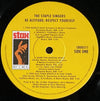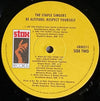







The Staple Singers – Be Altitude Respect Yourself
The Staple Singers (Cleotha Staples; Mavis Staples, Pops Staples, Yvonne Staples) - vocals [click here to see more vinyl featuring The Staple Singers]
Muscle Shoals Rhythm Section
Ben Cauley & the Memphis Horns – horns
Arranged by Al Bell & Johnny Allen
Written by Herb Schapiro (A1), William Friedman (A1), Luther Ingram (A2), Mack Rice (A2), Bettye Crutcher (A3), Homer Banks (A3, B2, B4), Raymond Jackson (A3, B2, B4), Alvertis Isbell (A4), Don Covay (A5), William R. Stevenson (A5), Wilson Pickett (A5), Carl Smith (B1), Marshall Jones (B1), Roebuck Staples (B3), Bobby Bloom (B5), Jeff Barry (B5)
1 LP, gatefold jacket
50th anniversary edition
Original analog Master tape : YES
Heavy Press : 180g
Record color : Black
Speed : 33 RPM
Size : 12'’
Stereo
Studio
Record Press : Memphis Record Pressing
Label : Concord Craft
Original label : Stax
Recorded 1971-1972 at Muscle Shoals Sound Studios, Alabama
Engineered by Jerry Masters, Ralph Rhodes, Terry Manning
Remixed by Terry Manning
Produced by Al Bell
Mastered by Jeff Powell at Take Out Vinyl
Lacquer cut by by Jeff Powell at Take Out Vinyl
Originally released in February 1972
Reissued in July 2022
Tracks:
Side A:
- This World
- Respect Yourself
- Name the Missing Word
- I'll Take You There
- This Old Town (People in This Town)
Side B:
- We the People
- Are You Sure
- Who Do You Think You Are? (Jesus Christ the Super Star)
- I'm Just Another Soldier
- Who
Reviews:
“Some Baby Boomers consider 1972 the pinnacle year for rock and roll. The turbulent 1960s with its mashup of noisy rock, earnest singer-songwriter preaching, and popular bubble gum slop had abated. America was a confusing mess with the Vietnam War, the re-election of President Richard Nixon, African American discrimination, and other intractable problems remained in the forefront of the headlines. The fresh music of that period tended to provide solace and an escape from reality. New acts such as Steely Dan, Roxy Music, and Big Star put out their first albums that smoothed down the edges of styles that had come before them and provided pleasant alternatives to the excesses of the music which had come before.
In terms of Black America, the previous decade’s Civil Rights Movement seemed to come to a standstill. In fact, the Civil Rights Act of 1972 dealt primarily with equal rights for women by prohibiting sex-based discrimination in any school that received funding from the federal government rather than racial issues. The popularity of music by African Americans in the larger culture had faded somewhat. There was only one album by a Black artist in the top 30 records of the year, Aretha Franklin’s live gospel Amazing Grace, which did not spawn any hit singles.
The Queen of Soul’s venture into commercial spiritual music was mirrored by the gospel act the Staple Singers, who signed with southern soul label Stax and released the secular, Be Altitude: Respect Yourself. The album featured three Top 40 hits, including the number one “I’ll Take You There”. The album received mixed reviews at the time. The Dean of Rock Critics Robert Christgau called it “a triumph of the Staples’ evolving pop style” in the Village Voice but gave it a “B-“ grade for its “silliness”. The record’s reputation has grown over time for several reasons, including the heavy use of its hits in movies depicting the early 1970s and contemporary commercials for Chevy, ZipRecruiter, and the Gap (to name just a few).
Craft Recordings just released a 50th-anniversary edition of the Staple Singers’ Be Altitude: Respect Yourself on 180-gram vinyl with all-analog mastering from the original stereo tapes. The music has never sounded better. Stax’s Muscle Shoals Rhythm Section and the Memphis Horns jump out of the speakers. Mavis’ voice, and that of the rest of the family, rings as clear as a bell. They fervently express concern, awareness, and, yes, even a bit of silliness in strong terms. Aretha may have famously sung Otis Redding’s declaration “Respect”, but the Staples took this one step further and proclaimed, “Respect Yourself” (which in several “respects” provide a more important lesson). Lines like “If you don’t respect yourself / Ain’t nobody gonna give a good cahoot, na na na na” may seem puerile to Christgau because of their colloquial nature. Still, they are far from juvenile in the context of life for African Americans in 1972, when gains in racial progress seemed to be fading away.
The other songs lean heavily to the gospel side—as may be expected considering the band’s roots—but despite the spiritual aspects of cuts such as “This World”, “We Are People”, ”Who Do You Think You Are (Jesus Christ the Superstar)” and “I’m Just Another Soldier”, this is soul/R&B music intended for a pop audience. Like the new white rock bands of 1972, the Staple Singers kept things smooth and offered comfort. Life was tough enough. Like the Christian beatitudes punned in the title, Be Altitude: Respect Yourself provides consolation.” Steve Horowitz, Pop Matters, July 2022
Ratings :
AllMusic : 4 / 5 ; Discogs : 4.34 / 5 ; Audiophile Audition : 4.5 / 5


